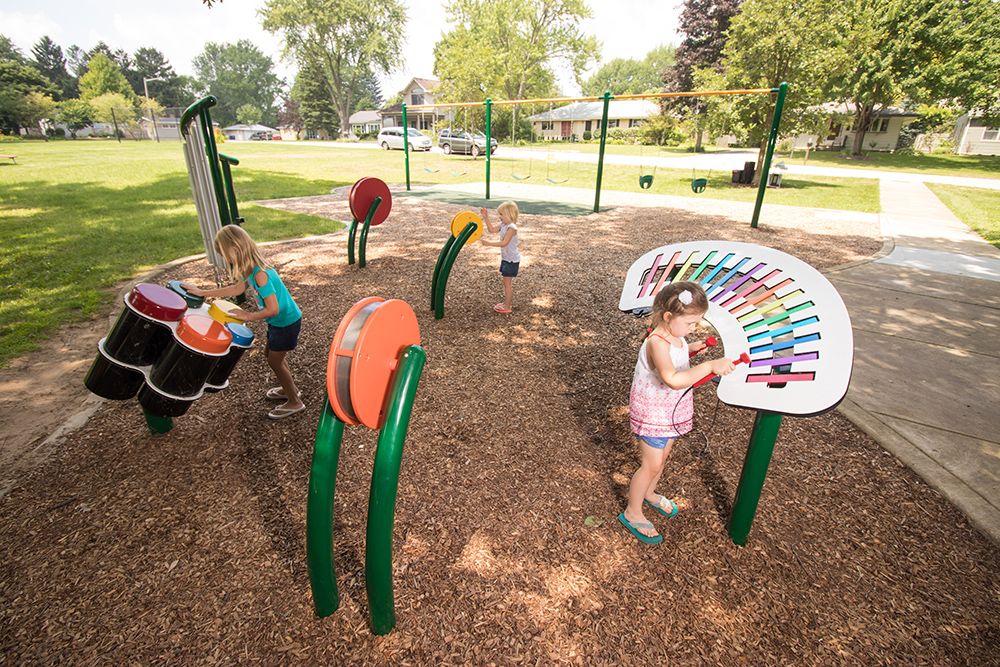The benefits of outdoor play and physical activity on combating obesity and promoting social development is well documented.
What some parents may be surprised to learn, however, is that your trip to the neighborhood playground or park can also contribute to your child’s cognitive development, especially if the equipment available promotes sensory play.
“Engaging your child in sensory play helps prepare them for life ahead.” Pamela Li wrote in Parenting for Brain. “Sensory play is not only important for babies and toddlers, who often have the time to play and explore at home, but also for preschoolers and elementary [aged] children.”
Sensory Play Makes Use of 7 Senses
When we think of sensory play we might naturally focus on touch and tactile activities such as finger painting or sand box play, but sensory play can involve other senses as well.
“Sensory play is about more than touch. Sensory play is best defined as age-appropriate activities that encourage kids to explore the world around them using one or more of their seven senses,” says the Miracle Recreation Equipment Company which offers customized commercial-grade sensory playground equipment.
Miracle Recreation says that sensory play makes use of seven of a child’s senses:
- Sight
- Touch
- Taste
- Smell
- Sound
- Vestibular
- Proprioceptive
While we are all familiar with those first five senses, the so-called classical senses, researchers agree there are more senses but disagree on the exact number.
“Some say we have seven senses, while others put the total at nine, ten, or twelve. What’s the right answer? It all depends on how you define things,” writes John M. Henshaw, author of “A Tour of Senses: How Your Brain Interprets the World”.
Henshaw writes we can thank Aristotle, in part, for the idea of five classical senses when he argued that for every sense, there is a sense organ.
“It’s when he goes on to say that there can be no sixth sense, because there are only five sense organs, that he gets himself into trouble. It doesn’t take much reflection to figure out that humans possess more than the five “classical” senses of sight, hearing, taste, smell, and touch,” writes Henshaw.
By the 1800s, researchers were aware of the vestibular system, located in the inner ear, which relates to movement and balance.
Proprioception is the sense that allows us to know what position our body parts are in without looking at them.
Both vestibular and proprioceptive senses make use of sensory receptors instead of sensory organs.
Cognitive Benefits of Sensory Play
Sensory play can have crucial benefits when it comes to cognitive development.
Miracle Recreation says that three main benefits include:
- Language Development: Sensory play encourages children to develop language so they can describe and observe what they are doing during and after the activity.
- Motor Skill Development: Research has found that there is evidence for a correlation between underlying categories of motor and cognitive skills, including complex motor skills and higher order cognitive skills.
- Stronger Brain Connections: Sensor play can help the brain filter out excess sensory experiences to focus on the ongoing activity. Says Miracle Recreation, “[Kids brains] learn how to identify what sensory experiences are important and which are not relevant to the moment.”
Li points out that cognitive development at younger ages is crucial as an infant is born with about 50 trillion synapses – brain cells or neurons and their connections – but in the first three years of life that number jumps to 1,000 trillion.
“Synapses in the brain are added or pruned based on life experiences. This is called experience dependent plasticity/neuroplasticity,” writes Li. “Neuroplasticity is the brain’s ability to change neural pathways or synapses to rewire the brain. Exposing children to various sensory experiences is necessary for a young brain to develop the proper sensory processing capabilities.”
Hands-on Learning: Sensory Play
Watch a young child play with a simple set of blocks and you can see sensory play in action as they use all their senses to explore the objects.
“Young children learn through using multiple senses simultaneously. Hands-on learning with concrete objects … leads to abstract thought as [children] grow and develop. In play experiences, combining the sense of touch with the senses of vision, hearing, taste, and smell helps build cognitive skills,” writes Kittie Butcher, Michigan State University Extension, and Janet Pletcher, Lansing Community College.
Kids can turn their playground sensory play into skills that they will utilize in school to read, write and solve science and math problems and carry those skills into adulthood.
“By providing students with materials that they can physically manipulate, play with and explore, teachers help them learn more about the world and develop crucial skills that they will utilize later in life,” said Caitrin Blake of Concordia University Nebraska.
